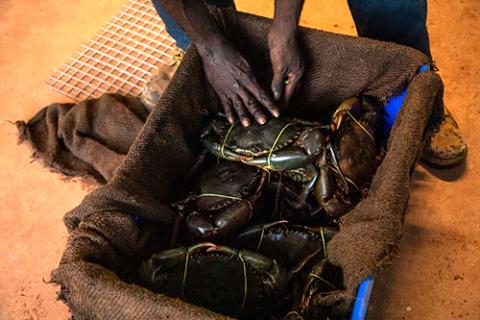For the Northern Territory’s Aboriginal coastal communities, seafood connection to community is much more important than just the meals it provides and the jobs it supports, finds new FRDC-supported research.
In the coastal community of Maningrida, 500 kilometres east of Darwin, the Northern Territory's first local Aboriginal fishing enterprise, Bawinanga Aboriginal Corporation, provides a focal point for researching the value of seafood to the local community.
Supported by an Aboriginal coastal licence, local fishers operate a small-scale commercial fishing business, selling fresh fish to local communities and into Darwin, providing an ongoing connection to country as well as jobs and income to support families.

Since 2017, they have provided more families with greater access to fresh seafood, applying their traditional knowledge in conjunction with fisheries regulations to target species in different seasons and locations on their customary sea country.
Highly valued for its role in connecting Aboriginal people with their lived experiences and memories of food and food gathering on country and their Traditional Knowledge systems, this fishery is also a source of fresh, nutritious food supporting individual and community health.
This is among the findings to come from an FRDC-funded research project underway to investigate Indigenous values to support the development of Indigenous fisheries.
Researcher at Monash University Beau Cubillo is leading the project, which also taps into his PhD research on Indigenous food systems.
Beau is a Larrakia and Wadjigan Aboriginal man from the Northern Territory, and says an Indigenous perspective is central to the research that has involved close collaboration with the Maningrida Traditional Owners, Bawinanga Aboriginal Corporation (BAC) and both Monash and Charles Darwin universities.
The Bawinanga Aboriginal Corporation is based in Maningrida, providing support services to the local community, including support for the Indigenous fishing enterprise, as well as to 20 outstation communities on the lands of the Kunibídji people in central Arnhem Land. Community members from Maningrida and outstation communities have helped to co-create and direct the focus of the study.
The value of seafood
Beau says the community values the good quality food and jobs that fishing and seafood provide. For the people of Maningrida, seafood is also medicine and linked to identity.
It provides the foundation for intergenerational knowledge transfer and maintenance of cultural and social traditions. It feeds the bodies and the spirits of Aboriginal people and their communities, including connections to country and community that are essential to their perspectives of ‘health and wellbeing’.
Through part of the research investigation, 10 themes emerged from the 13 ‘yarning’ sessions undertaken between Beau and 16 community members. Yarning is a recognised conversational practice amongst Aboriginal and Torres Strait Islander researchers in Australia. It involves a two-way sharing of knowledge between the researcher and community members as equals.
Themes to emerge from these conversations were: respecting elders, culture, connection to country, Aboriginal nutrition and traditional medicinal knowledge, Aboriginal fishing enterprise, lived experience, intergenerational knowledge transfer, interconnectedness, and barriers to seafood.
Diminishing opportunities for the exchange of traditional knowledge within local communities is a significant barrier to connecting people with seafood and its broader benefits.
To address this, one output from the FRDC project will be the development of new information resources. The final materials are expected to be available by the end of the year and will be developed in consultation with members of the Maningrida community.
Food systems and self-determination
Beau says the FRDC project is part of his broader PhD research identifying aspects of Indigenous food systems that contribute to health outcomes for Indigenous people.
He hopes this work will be considered as part of future marine and fisheries policies, and the Australian Government’s ‘Closing the Gap’ initiatives, bringing self-determination for Indigenous coastal communities in control of their local food systems.
FRDC Senior Research Portfolio Manager Josh Fielding says Indigenous fisheries are a core focus for FRDC and Beau’s project will provide greater understanding of Indigenous fisheries and the values that are important to Aboriginal communities.
“The Indigenous fishing sector is a little bit unique in that Indigenous people operate in commercial, recreational and Indigenous cultural fishing, all of which deliver different elements for Indigenous Australians.”
“Beau’s work builds on previous FRDC research coming directly from the perspectives of Indigenous communities. It shows it is not just about harvesting something and selling it to make money. It includes the provision of food for communities, nutrition and health benefits and just as importantly, connection to culture and country,” Josh concluded.
Related FRDC Projects
2019-143: An investigation of Indigenous knowledges and nutritional health and wellbeing benefits and values of seafood for supporting Indigenous fisheries development
2015-205: Indigenous fishing subprogram: mapping livelihood values of Indigenous customary fishing
This reflects R&D Plan Outcomes 1 and 3





